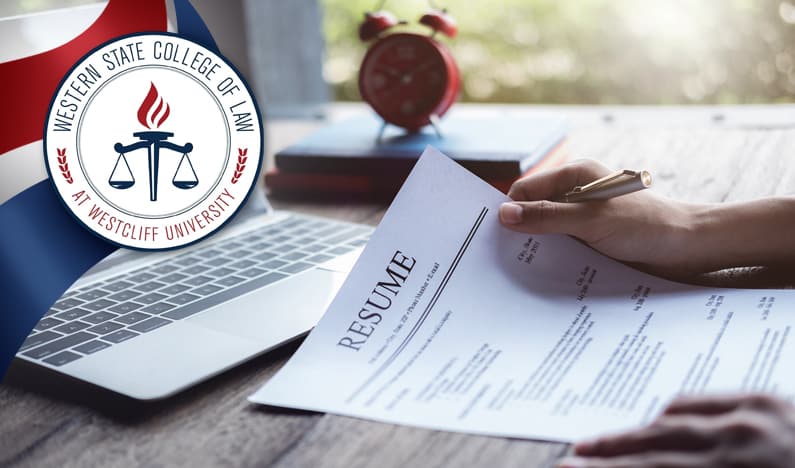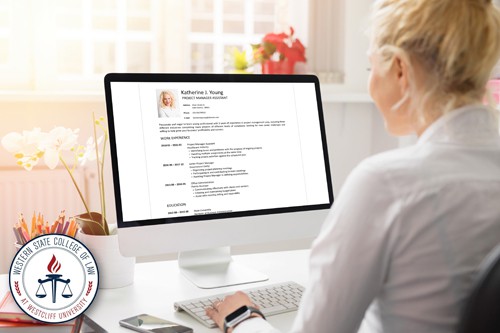Western State is committed to your success whether you just graduated from law school and are looking to land a full-time job or are finishing your first or second year of school. We’ve outlined some tips below to help you prepare your resume for the next big opportunity.
- Periodically update a comprehensive resume. During law school, you are constantly growing your skillset. Waiting until you apply for a job to update your resume can leave you scrambling to recall all the accomplishments you’ve had along the way. Our career development plans provide checklists for 1L, 2L and 3Ls, including recommendations to update your resume twice a year – during winter and summer break. Remember to add any memberships, awards, class ranks, student involvement, key courses, etc. Creating a comprehensive resume which holds all achievements can help you easily pick and choose when applying for a specific job.
Tailor your resume and cover letter. The most important tip we can give you is as follows: Don’t waste a recruiter’s time. Streamlining your resume to show relevant information not only underscores your interest in a particular position, but it can help you stand out from other applicants. If the position you’re applying for is research heavy, focus more on displaying the skills you developed in that direction. Interested in an opportunity in litigation? Highlight the work experiences, courses and activities that bring those specific skills to life. In addition to your resume, tailoring your cover letter to ensure it includes key examples of how your experience meets their requirements shows that you are well-prepared for the role.
- Be specific. When showcasing experience, be specific about the essential responsibilities and tasks you completed during your externships or past work and quantify successes or outcomes if possible. It can be done in bullet point format or a few short sentences, but the important thing to do is include numbers and positive action verbs. Stating that you conducted research for 20 high profile cases is much more impressive than simply saying “support research for court cases.”
- Prepare a list of references. Identifying individuals along your path who can speak to your skills is important. Employers will sometimes ask for a list of references (which are provided in a separate document, apart from your resume). Connect early with professors and previous or current employers to let them know you are preparing to apply for jobs. Sometimes you can even ask for a letter of recommendation in advance to have at the ready. When choosing references or asking for letters of recommendation, it is important to share your current resume with them, as well as highlight a list of accomplishments that you achieved under their guidance to help them prepare.
Update profiles on hiring platforms. In addition to the traditional resume, it is important to update your hiring platform profile, including LinkedIn and Symplicity. Most hiring platforms are integrated with employer databases to allow you to submit your resume and apply directly through the platform. Your profile page should have some general information about you and your interests, as well as previous work experiences and accolades. Keeping the page up to date and professional is important since hiring managers might search your name during the application process.
Ultimately, the question you need to ask when you’re building your resume and profiles is: Am I showing that I’m the best possible candidate for this job? If not, then go back and revise.
Our career development department has several resources available to help you identify and pursue your career goals or reach out via email to Deirdre Kelly (dekelly@wsulaw.edu) and Oscar Teran (oteran@wsulaw.edu) to go over your resume!


 Tailor your resume and cover letter. The most important tip we can give you is as follows: Don’t waste a recruiter’s time. Streamlining your resume to show relevant information not only underscores your interest in a particular position, but it can help you stand out from other applicants. If the position you’re applying for is research heavy, focus more on displaying the skills you developed in that direction. Interested in an opportunity in litigation? Highlight the work experiences, courses and activities that bring those specific skills to life. In addition to your resume, tailoring your cover letter to ensure it includes key examples of how your experience meets their requirements shows that you are well-prepared for the role.
Tailor your resume and cover letter. The most important tip we can give you is as follows: Don’t waste a recruiter’s time. Streamlining your resume to show relevant information not only underscores your interest in a particular position, but it can help you stand out from other applicants. If the position you’re applying for is research heavy, focus more on displaying the skills you developed in that direction. Interested in an opportunity in litigation? Highlight the work experiences, courses and activities that bring those specific skills to life. In addition to your resume, tailoring your cover letter to ensure it includes key examples of how your experience meets their requirements shows that you are well-prepared for the role. Update profiles on hiring platforms. In addition to the traditional resume, it is important to update your hiring platform profile, including LinkedIn and
Update profiles on hiring platforms. In addition to the traditional resume, it is important to update your hiring platform profile, including LinkedIn and